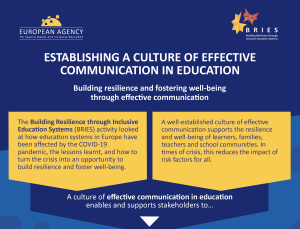This area contains multimedia materials including key messages, presentations and links to videos from the EASNIE YouTube channel.
Implementation of the European Child Guarantee – Promoting Inclusive Education in Greece, phase 2
The ‘Implementation of the European Child Guarantee – Promoting Inclusive Education in Greece, phase 2’ project aimed to assist the Greek Ministry of Education, Religious Affairs and Sports (MERAS). This video highlights the main achievements and milestones of the project, funded by the European Union via the Technical Support Instrument (TSI).
The Agency's Vision for Inclusive Education Systems
Our ultimate vision for inclusive education systems is to ensure that all learners of any age are provided with meaningful, high-quality educational opportunities in their local community, alongside their friends and peers.
BRIES Guidance for Establishing a Culture of Effective Communication in Education video
This video presents the Guidance for Establishing a Culture of Effective Communication in Education, which is the Building Resilience through Inclusive Education Systems (BRIES) activity’s main output.
Infographic: Building Resilience through Inclusive Education Systems

The Building Resilience through Inclusive Education Systems (BRIES) activity looked at how education systems in Europe have been affected by the COVID-19 pandemic, the lessons learnt, and how to turn the crisis into an opportunity to build resilience and foster well-being.
